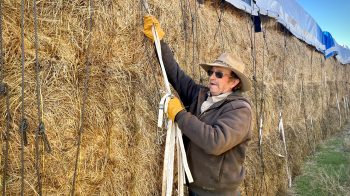Skill or chance? States debate historical horse games
Update: The Wyoming Pari-Mutuel Comission — the state agency that regulates gaming in Wyoming — has issued an order temporarily banning historical horse racing machines, beginning Monday. This follows the release of a Wyoming attorney general’s report that found that the machines’ bonus rounds were not in compliance with a 2013 law that legalized historical horse racing machines. The commission will be holding a special meeting Thursday to discuss how to bring the historical horse racing machines into compliance with state law. The original story is below.
If you want to bet on a horse race in Laramie, Wyoming, you go to Wyoming Downs, a little gambling parlor on the edge of town. Lu Schellhaas is a regular there, and on this day, she’s on a hot streak: up to $750 from a $10 bet.
“So this is when I should go home,” she said. “But no, I am going to hit the button again!”
Schellhaas is playing Wyoming Downs’ most popular attraction: a historical horse racing machine. These games have the lights and sounds of a classic casino-style slot machine. But while slots determine whether you win at random, historical racing machines are tied to the outcome of a past horse race. Before you hit the big bet button, you’re shown a display of horse racing stats, and you’re supposed to use those stats to pick your three cherries, or dancing cowboys, or whatever variables the machine uses.
The reason this is legal is that it’s considered a game of skill. Slots are considered a game of chance. So, you might think it’s safe to assume a winning player like Schellhaas knows a bit about horse racing, right? Well, not really.
“I don’t know a thing,” Schellhaas said after another high-yield push of the button. “You don’t really need to.”
Historical horse racing games, like the ones above in Laramie, Wyoming, are considered a game of skill. (Miles Bryan)
The games at Wyoming Downs offer an experience similar to playing slots at one of Wyoming’s Native America-run casinos, but without the long drive. For now, historical horse racing machines are legal in Wyoming, Oregon, Arkansas and Kentucky, and are being debated in Texas. These are states where traditional slot machines are restricted to Native American casinos or where they’re banned entirely. But even though the players might not care much for actual horse racing, the horse racing industry cares a lot about these players.
There will be 32 days of live horse racing in Wyoming this year, up from four race days before historical horse racing machines were legalized in 2013.
“There would be no live horse racing in Wyoming if not for historical horse racing,” said Eugene Joyce, who puts on live horse races and also operates historical horse racing machines in the state.
In Wyoming, and in most of the other states with historical horse racing machines, only companies that put on live horse racing are allowed to run historical horse racing machines. Joyce said his company, Wyoming Horse Racing LLC, is projected to bring in about $11 million this year, and 91 percent of that gross revenue will come from historical horse racing machines. Joyce says the games are just a way to bring the thrill of live horse racing to a wider audience.
“Make no mistake, it is 100 percent horse racing, but it’s packaged in a way to appeal to a new customer base,” he said.
But when the people who run Wyoming’s only legal traditional slot machines look at places like Wyoming Downs, they don’t see horse racing.
“If it walks like a duck, quacks like a duck, it’s a duck,” said Wind River Casino CEO James Conrad. “The bottom line is that these are slot machines.”
The casino sits on Wyoming’s Wind River Indian Reservation, and Conrad said more business at places like Wyoming Downs means less business at the reservation casinos. Idaho lawmakers legalized historical horse racing machines two years ago, but recently banned them after a coalition of state tribes raised objections. Conrad said his casino is the largest employer on the reservation.
“We have 800 employees. Ninety percent are Native American,” he said. “And if we have slot machines everywhere [in the state], it will affect the number of employees we have.”
There’s a lot happening in the world. Through it all, Marketplace is here for you.
You rely on Marketplace to break down the world’s events and tell you how it affects you in a fact-based, approachable way. We rely on your financial support to keep making that possible.
Your donation today powers the independent journalism that you rely on. For just $5/month, you can help sustain Marketplace so we can keep reporting on the things that matter to you.


















